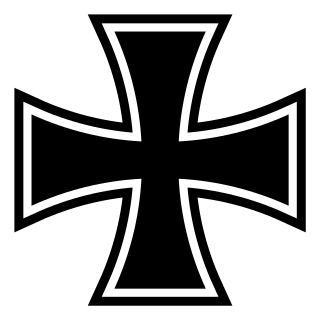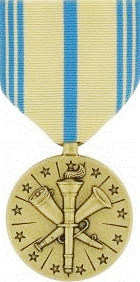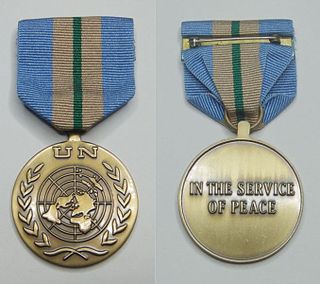Award ribbons
Length of Service Decorations
| Length of Service Decoration | ||
|---|---|---|
| Emblem | Name | Remarks |
| | Length of Service Decoration German : Dienstleistungsabzeichen French : Insigne de prestation de service Italian : Distintivi del servizio | This ribbon is worn with a series of rosettes to indicate total length of service. No rosette indicates 90 days of service. |
| | Length of Service Decoration | 170 days service |
| | Length of Service Decoration | 250 days service |
| | Length of Service Decoration | 350 days service |
| | Length of Service Decoration | 450 days service |
| | Length of Service Decoration | 550 days service |
| | Length of Service Decoration | 650 days service |
| | Length of Service Decoration | 750 days service |
| | Length of Service Decoration | 850 days service |
| | Length of Service Decoration | 950 days service |
Exceptional service
| Emblem | Name | Remarks |
|---|---|---|
| | Exceptional service German : Ausserordentliche Leistung French : Prestation exceptionnelle Italian : Prestazione eccezionale | The award is given for:
This award is personally given by the Chief of the Armed Forces for outstanding achievements. |
Decorations
These ribbons are worn in place of the older Sugus type badges (called that way because of their sugus-like rectangular shape and because a decoration is like a sweet). Exception: the former Alpine Insignia looked different and was replaced by the sugus type.
| Alpine Insignia | ||
|---|---|---|
| Emblem | Name | Remarks |
| | Alpine Decoration German : Hochgebirgsabzeichen French : Insigne de haute montagne Italian : Distintivo d’alta montagna | This replaced the Alpine Badge previously issued by the Swiss Army. The Alpine Decoration is awarded to those members of the Swiss Army who have received specialist training in mountain warfare and rescue. |
| Skill-at-arms Decorations | ||
| | Assault Rifle, Level 1 German : Sturmgewehr Stufe 1 French : Fusil d’assaut degré 1 Italian : Fucile d’assalto grado 1 | |
| | Assault Rifle, Level 2 German : Sturmgewehr Stufe 2 French : Fusil d’assaut degré 2 Italian : Fucile d’assalto grado 2 | |
| | Pistol, Level 1 German : Pistole Stufe 1 French : Pistolet degré 1 Italian : Pistola grado 1 | |
| | Pistol, Level 2 German : Pistole Stufe 2 French : Pistolet degré 2 Italian : Pistola grado 2 | |
| Training Decorations | ||
| | Buddy Aid/NBC Defence German : Kameradenhilfe/ABC Abwehr French : Aide au camarade/défense ABC Italian : Aiuto al camerata/difesa NBC | |
| | Coxswain German : Wasserfahrer French : Navigateur Italian : Battelliere | |
| | Pointer (weapon) German : Richter French : Pointeur (arme) Italian : Puntatore (arma) | |
| Sports Decorations | ||
| | Military sport 1 German : Militärsport 1 French : Sport militaire 1 Italian : Sport militare 1 | |
| | Military sport 2 German : Militärsport 2 French : Sport militaire 2 Italian : Sport militare 2 | |
| | Military sports competition German : Militärsport Wettkampfauszeichnung French : Compétition de sport militaire Italian : Sport militare competitivo | |
Mission insignia
| Service within Switzerland | ||
|---|---|---|
| Emblem | Name | Remarks |
| | Operations within Switzerland German : Inland-Einsätze French : Engagements à l’intérieur du pays Italian : Impieghi in Svizzera | Awarded for 5 consecutive days of "Assistenzdienst", e.g. at the Annual WEF Meeting Davos. Update this ribbon can be awarded with silver or gold rosettes depending on the duration of the assignment. |
| Service abroad | ||
| | Kosovo Mission Insignia | Awarded for 150 days of service as a member of the Swisscoy. [3] |
| | Bosnia-Herzegovina Mission Insignia | Awarded for 150 days of service with the Organization for Security and Co-operation in Europe (OSCE) Swiss Headquarters Support Unit (SHQSU) to Bosnia-Herzegovina. [3] This medal is no longer awarded for service in Bosnia and Herzegovina, instead the Operations abroad Peace Support is given to military staff members. |
| | Korea Mission Insignia | Awarded for 150 days of service with the Neutral Nations Supervisory Commission. [3] |
| | Namibia Mission Insignia | Awarded for 150 days of service with the United Nations Transition Assistance Group (UNTAG). [3] |
| | Western Sahara Mission Insignia | Awarded for 150 days of service with the United Nations Mission for the Referendum in Western Sahara (MINURSO). [3] |
| | Peace Support Mission Insignia | Awarded for 150 days of service in peace support operations outside of the framework of an international organization. Like missions in Bosnia and Herzegovina and all UN missions with UNMAS as a Swiss In-Kind (seconded to the United Nations). [3] |
| | UN Military Observer Mission Insignia | Awarded for 150 days of service as a military observer with a United Nations Peacekeeping Mission. [3] |
| | Partnership for Peace Mission Insignia | Awarded for service with NATO Partnership for Peace. [4] |
| | Long Leave for Military Duties Abroad German : Lange Ausland-Abkommandierung French : Service commandé de longue durée à l’étranger Italian : Servizi comandati prolungati | Awarded for at least 150 training days service in a training course of a foreign army as part of the "LAK" program. [4] |
| | UNO OSCE OTAN Mandates Mission Badge Example | Because of the diversity, all portraits of the ribbons of the UNO / OSCE mandates are not illustrated. [5] |
Off-duty activities
| Emblem | Name | Remarks |
|---|---|---|
| | Off-duty activity, level 1 German : Ausserdienstliche Tätigkeit Stufe 1 French : Activité hors du service degré 1 Italian : Attività fuori del servizio livello 1 | For recognized activities with military umbrella organizations and societies. |
| | Off-duty activity, level 2 German : Ausserdienstliche Tätigkeit Stufe 2 French : Activité hors du service degré 2 Italian : Attività fuori del servizio livello 2 | Further recognized activities and leadership within a military umbrella organization or society. |
| | Off-duty activity, level 3 German : Ausserdienstliche Tätigkeit Stufe 3 French : Activité hors du service degré 3 Italian : Attività fuori del servizio livello 3 | Reaching level 1 and level 2 is not required. 6 years of active membership in a board of directors of a military society or an umbrella organization of its associations or sections. |
Source: [6]










